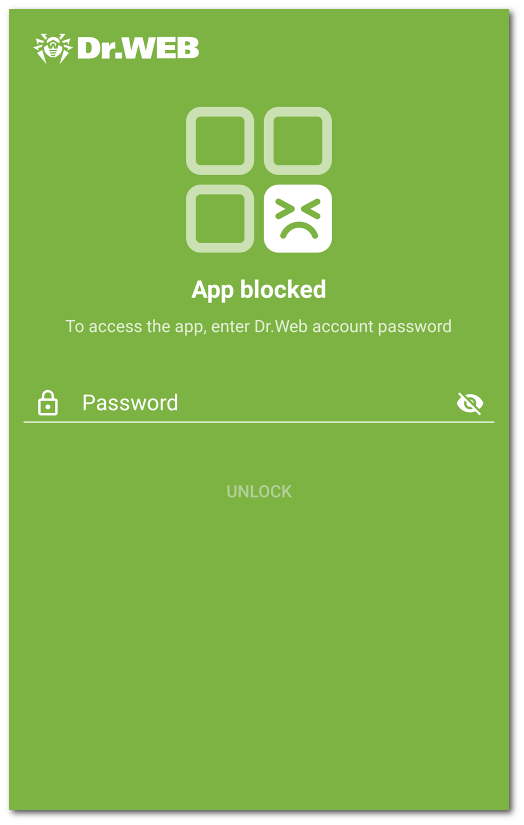This section contains the list of all apps installed on the device.
Blocking access to apps and app groups
The Parental Control component allows you to block access to individual apps or their groups. When an app with blocked or restricted access is launched, the blocking screen appears. To get access you need to enter the Dr.Web account password or scan your fingerprint.
To block access, select the check box next to the name of the app or the group. To restore access, clear the check box.
App groups
By default, all apps are separated into system groups by category. To see apps within a group, tap the group name.
On devices with Android 8.0 or earlier, all apps are found in the Other system group. |
You can also create your own app groups.
To create a user app group
1.Tap the icon in the bottom right corner of the screen.
2.Select the New group option.
3.Enter the name of the new group.
4.Tap the icon next to the apps you want to add to the new group.
5.Tap the icon to save the new group.
User-defined groups are displayed at the top of the app group list.
To edit a user group
1.Swipe the group name left.
2.Tap the ![]() icon.
icon.
3.Make changes.
4.Tap the icon in the top-right corner of the screen.
To delete a user group
1.Swipe the group name left.
2.Tap the icon.
To delete multiple user groups
1.Tap and hold the name of one of the groups to be deleted.
2.Select the other groups to be deleted.
3.Delete the groups by tapping the icon in the top-right corner of the screen.
System groups cannot be edited or deleted. |
If the Block browsers without URL filter or Block new apps option is enabled in the Parental Control settings, the Browsers without URL filter or New apps system group will appear on the app list. To restore access to apps in these groups, disable the corresponding option in the Parental Control settings.
Searching through the list of apps
You can use the search function to navigate the app list.
To search by app or app group name
1.Tap the icon in the bottom right corner of the screen.
2.Select the Search option.
3.Enter your query in the search field at the bottom of the screen.
You can block access to app groups all the time or in the set time intervals.
Restriction type is shown to the right of the group name. Two restriction types are available:
•Always—access to the app group is always blocked.
•Interval—access to the app group is blocked within a set time interval.
By default, when blocking an app group, the access is always blocked.
To set a time-based restriction
1.Tap the restriction type to the right of the app group.
2.Tap ![]() in the bottom-right corner of the screen.
in the bottom-right corner of the screen.
3.Select the days of the week when the restriction will be active.
4.Tap Start and set the start of the interval when access will be blocked.
5.Tap OK to confirm the selected time.
6.Tap End and set the end of the interval when access will be blocked.
7.Tap OK to confirm the selected time.
8.Tap in the top-right corner of the screen to save the restriction.
Only one time interval can be set for one restriction. To block the app group at other times, create more restrictions.
You can edit and delete restrictions.
To edit a restriction
1.Tap the restriction type to the right of the app group.
2.Tap the restriction you need.
3.Make changes.
4.Save the changes by tapping the icon in the top-right corner of the screen.
To delete a restriction
1.Tap the restriction type to the right of the app group.
2.Swipe the restriction left.
3.Tap the icon.
You can block access to Dr.Web component settings: Call and SMS filter, URL filter, Firewall, and the Dr.Web app settings.
To block access to Dr.Web component settings
1.On the Parental Control main screen, select Components.
2.Select the check boxes next to the Dr.Web components you want to block access to:
•Call and SMS filter. The device user will not be able to change the list of the allowed or blocked numbers.
•URL filter. The device user will not be able to change the list of websites and website categories they have access to.
•Firewall. The user will not be able to change any rules and restrictions.
•Dr.Web settings. The user will not be able to reset the settings.
Time-restricted access is not available for Dr.Web components. Access will be blocked at all times. |
To access a blocked component, enter the Dr.Web account password or scan your fingerprint (if the corresponding setting is on).
The blocked app screen appears when a blocked app is launched (see Figure 21). To access the app, enter the Dr.Web account password and tap Unlock. Access to the app can be granted by means of scanning a fingerprint if the Unlock with fingerprint option is enabled in the Parental Control settings.
New apps
If the Block new apps option is enabled in the Parental Control settings, all apps installed after enabling the option will be placed into the New apps system group. When an app from the New apps group is launched, the blocked app screen shows an option that allows you to grant access to the app from now on.
To allow access to a new app
1.Launch the app.
2.On the blocked app screen, enter your Dr.Web account password.
3.Select the check box next to the Remove from “New apps” group option.
4.Tap Unlock.
